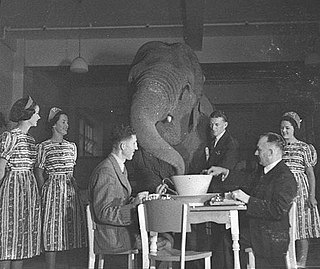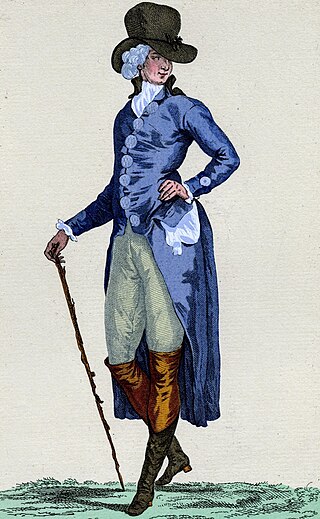Related Research Articles
Keeping up with the Joneses is an idiom in many parts of the English-speaking world referring to the comparison to one's neighbor as a benchmark for social class or the accumulation of material goods. To fail to "keep up with the Joneses" is perceived as demonstrating socio-economic or cultural inferiority. The phrase was coined by a 1910s comic strip of the same name.

The expression "the elephant in the room" is a metaphorical idiom in English for an important or enormous topic, question, or controversial issue that is obvious or that everyone knows about but no one mentions or wants to discuss because it makes at least some of them uncomfortable and is personally, socially, or politically embarrassing, controversial, inflammatory, or dangerous. The metaphorical elephant represents an obvious problem or difficult situation that people do not want to talk about.
A straw poll, straw vote, or straw ballot is an ad hoc or unofficial vote. It is used to show the popular opinion on a certain matter, and can be used to help politicians know the majority opinion and help them decide what to say in order to gain votes.
Democrat Party is an epithet and pejorative for the Democratic Party of the United States, often used in a disparaging fashion by the party's opponents. While use of the term started out as non-hostile, it has grown in its negative use since the 1940s, in particular by members of the Republican Party—in party platforms, partisan speeches, and press releases—as well as by conservative commentators and third party politicians.
In politics, a front-runner is a leader in an electoral race. While the front-runner in athletic events is generally clear, a political front-runner, particularly in the presidential primary process, is less so as a potential nominee may lead in the polls, have the most name recognition, the most funds raised, or a combination of these. The front-runner is most often declared by the media who are following the race and is written about in a different style than his or her challengers.

A head is the part of an organism which usually includes the ears, brain, forehead, cheeks, chin, eyes, nose, and mouth, each of which aid in various sensory functions such as sight, hearing, smell, and taste. Some very simple animals may not have a head, but many bilaterally symmetric forms do, regardless of size.
Making a mountain out of a molehill is an idiom referring to over-reactive, histrionic behaviour where a person makes too much of a minor issue. It seems to have come into existence in the 16th century.
"Break a leg" is an English language idiom used in the theatre or other performing arts to wish a performer "good luck". An ironic or non-literal saying of uncertain origin, "break a leg" is commonly said to actors and musicians before they go on stage to perform or before an audition. Though the term likely originates in German, the English expression is first attributed in the 1930s or possibly 1920s, originally documented without specifically theatrical associations. Among professional dancers, the traditional saying is not "break a leg", but the French word merde
Jack Robinson is a name present in two common figures of speech. When referring to Jack Robinson, it is used to represent quickness. In contrast, the phrase "(A)round Jack Robinson's barn" has the opposite connotation, implying slowness, as it is often used to refer to circumlocution, circumvention, or doing things in roundabout or unnecessarily complicated ways.

An idiom is a common word or phrase with a figurative, non-literal meaning that is understood culturally and differs from what its composite words' denotations would suggest; i.e. the words together have a meaning that is different from the dictionary definitions of the individual words. By another definition, an idiom is a speech form or an expression of a given language that is peculiar to itself grammatically or cannot be understood from the individual meanings of its elements. For example, an English speaker would understand the phrase "kick the bucket" to mean "to die" – and also to actually kick a bucket. Furthermore, they would understand when each meaning is being used in context.

Being between Scylla and Charybdis is an idiom deriving from Greek mythology, which has been associated with the proverbial advice "to choose the lesser of two evils". Several other idioms, such as "on the horns of a dilemma", "between the devil and the deep blue sea", and "between a rock and a hard place" express similar meanings. The mythical situation also developed a proverbial use in which seeking to choose between equally dangerous extremes is seen as leading inevitably to disaster.

It takes two to tango is a common idiomatic expression which suggests something in which more than one person or other entity are paired in an inextricably-related and active manner, occasionally with negative connotations.

"Bring Us Together" was a political slogan popularized after the election of Republican candidate Richard Nixon as President of the United States in the 1968 election. The text was derived from a sign which 13-year-old Vicki Lynne Cole stated that she had carried at Nixon's rally in her hometown of Deshler, Ohio, during the campaign.
Damning with faint praise is an English idiom, expressing oxymoronically that half-hearted or insincere praise may act as oblique criticism or condemnation. In simpler terms, praise is given, but only given as high as mediocrity, which may be interpreted as passive-aggressive.

Have a nice day is a commonly spoken expression used to conclude a conversation, or end a message by hoping the person to whom it is addressed experiences a pleasant day. It is often uttered by service employees to customers at the end of a transaction, particularly in Israel and the United States. According to some journalists and scholars, its repetitious and dutiful usage has resulted in the phrase developing secondary cultural connotations of, variously, impersonality, lack of interest, passive–aggressive behavior, sarcasm or as a definitive way to put an end to a conversation and dismiss the other party.

"With flying colours" is a popular idiom of the English language that is used to describe how well someone has completed a task. For example, a common use of the phrase is to refer to someone having passed a test or other examination "with flying colours," i.e. passed the test easily or with an exceptionally high score. The phrase originated in the Age of Discovery, when ships would return to port with their flags ("colours") either raised or lowered to signify that the ship had either been successful or defeated, with raised flags indicating success and lowered flags indicating defeat. Thus, "with flying colours" literally means that someone has completed a task, while idiomatically, it connotes particular success in that task.
"Out of left field" is American slang meaning "unexpected", "odd" or "strange".

Keeping Up with the Joneses was an American gag-a-day comic strip by Pop Momand that ran from March 31, 1913, to April 16, 1938. It depicts the McGinis family, Aloysius, Clarice, their daughter Julie, and their housekeeper Bella Donna, who struggle to "keep up" with the lifestyle of their neighbors, the unseen Joneses. The comic coined the well-known catchphrase "keeping up with the Joneses", referring to people's tendency to judge their own social standing according to that of their neighbors.
Get away with murder is an English idiom, used to describe escaping the consequences of an action. While literally it refers to someone committing a murder and not being punished, it can be used figuratively of someone who is seen not to suffer the consequences of their actions: "I hate to see a mother who lets her children get away with murder".

To put on airs, also give airs, put in airs, give yourself airs, is an English language idiom and a colloquial phrase meant to describe a person who acts superior, or one who behaves as if they are more important than others.
References
- Notes
- ↑ Heacock 2003 , p. 19
- 1 2 "The Mavens' Word of the Day: bang for the buck". Random House. December 19, 1997. Archived from the original on February 6, 2012. Retrieved December 7, 2010.
- ↑ Safire, William. "William Safire, Political Columnist and Oracle of Language". Market and Politics. Retrieved March 10, 2023.
- ↑ Mayer 2010 , p. xxiv
- ↑ Pavelec 2009 , p. 325
- ↑ Safire 2008 , p. 51
- ↑ Feldman 1989 , p. 199
- ↑ Kort 2001 , p. 39
- ↑ Ammer 2006 , p. 34
- ↑ "Case Study – Pepsico: Cola gets a pep talk". LexisNexis . April 16, 2007. Archived from the original on May 25, 2024. Retrieved December 8, 2010.
- 1 2 Powers 2010 , p. 135
- ↑ Stone 2001 , p. 54
- Bibliography
- Ammer, Christine (2006). The Facts on File dictionary of Clichés. New York: Infobase Publishing. ISBN 0-8160-6279-X.
- Feldman, Jonathan (1989). Universities in the Business of Repression: The Academic-Military-Industrial Complex and Central America. Boston: South End Press. ISBN 0-89608-354-3.
- Heacock, Paul (2003). Cambridge Dictionary of American Idioms. Cambridge: Cambridge University Press. ISBN 0-521-53271-X.
- Kort, Michael (2001). The Columbia Guide to the Cold War. New York: Columbia University Press. ISBN 0-231-10773-0.
- Mayer, Michael S. (2010). The Eisenhower Years. New York: Infobase Publishing. ISBN 0-8160-5387-1.
- Pavelec, Sterling Michael (2009). The Military-Industrial Complex and American Society. Santa Barbara, California: ABC-CLIO. ISBN 1-59884-187-4.
- Powers, Lauren (2010). The Trouble with Thinking. Bloomington, Indiana: iUniverse. ISBN 1-936236-28-1.
- Safire, William (2008). Safire's Political Dictionary. New York: Oxford University Press. ISBN 0-19-534334-4.
- Stone, Matthew L. (2001). Modern Sports & GT Cars Under $20k. St. Paul, Minnesota: MotorBooks International. ISBN 0-7603-0899-3.